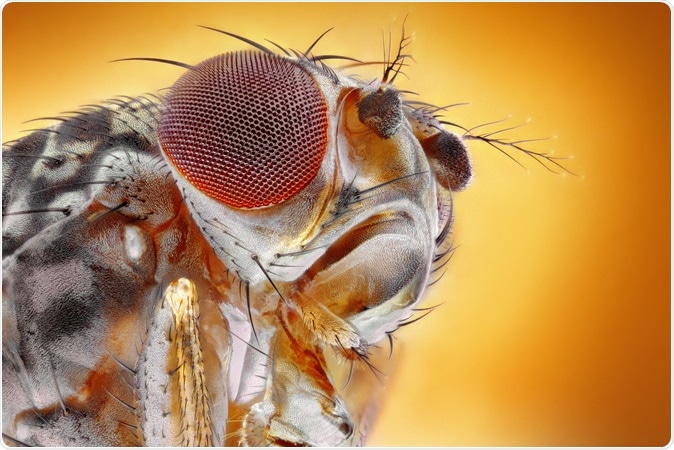Researchers at Bar-Ilan University in Israel have found that male fruit flies (Drosophilia melanogaster) enjoy ejaculation and sex and are also keen on alcohol consumption. The results of this novel study that shows that sexual gratification is preserved across species was published in the latest issue of the journal Current Biology this week.

Microscopic extreme sharp and detailed image of head and eye of a fruit fly (Drosophila melanogaster). Image Credit: Tomatito / Shutterstock
Galit Shohat-Ophir, researcher, explained that there are tiny amounts of a peptide called Neuropeptide F that is present in the brain. When the male flies mate successfully, the researchers found that there was a rise in this peptide level. As an alternate reward, when these male flies are not allowed to mate, they are more inclined to consume alcohol the researchers found.
Shohat-Ophir and lead author Shir Zer-Krispil along with their team worked on this study in collaboration with HHMI Janelia Research USA. They used novel optogenetic tools. They genetically modified the flies first to make sure that certain neurons in thyem light up when specific light was thrown on them. When the flies were exposed to red light, neurons that contained neuropeptide corazonin (CRZ) lit up or got activated. These neurons present in the abdomen of the flies are responsible to trigger release of sperm within the semen of the flies. Shohat-Ophir explained that the team looked at gratification or pleasure that the flies obtained at sexual encounters – either during courtship, response to female pheromones and release of the seminal fluid during ejaculation.
The flies flocked towards the red light in order to activate their CRZ neurons, the team found. This made them ejaculate and provided them with a pleasurable sensation the team noted. The flies were then provided with the red light as well as a smell that reminded them of ejaculation. The flies preferred both the visual as well as olfactory or smell stimulation. Continued stimulation and pleasure also showed raised neuropeptide F levels in the brain of these flies after a few days. This was same as in flies that actually mated with females.
Now all flies were offered liquid food and liquid food spiked with alcohol. These satisfied males preferred non-alcoholic food. The male flies that were not allowed to mate and also did not have their CRZ stimulated in red light to cause artificial gratification, preferred liquid food containing alcohol.
Shohat-Ophir explained that this study points towards brain behavior with drugs of abuse. “Drugs of abuse use the same systems in the brain that are used to process natural rewards. This allows us to use simple model organisms to study aspects of drug addiction, including the interplay between natural and drug rewards and the connection between experience and the mechanisms that underlie the risk to develop drug addiction,” she says. More studies are needed to understand this phenomenon better say the researchers.